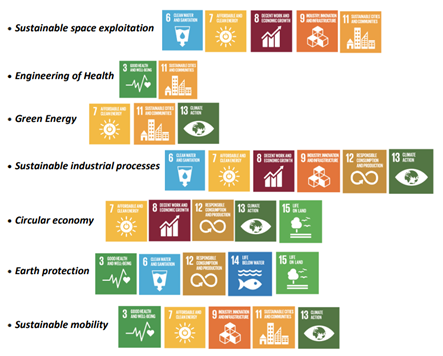The Department of Civil and Industrial Engineering (DICI) was founded in 2012 as a result of the reform of the Italian university system. It is a merger of the previous departments of aerospace engineering, chemical engineering, industrial chemistry and materials science, mechanical engineering, nuclear and production engineering, and part of the civil engineering department.
Recognizing that fundamental research and innovation play a crucial role in addressing the various economic, social, and environmental challenges, DICI adopts a research strategy aimed at achieving the sustainable development goals outlined in the UN Resolution of the 2030 Agenda. Within this framework, the research themes pursued by the Department fall into the following general macro areas:

In particular, in the aerospace field, experimental activities and numerical modeling/simulation are conducted to address current and future challenges for sustainable air transportation and access to space and its resources.
In the field of Chemical Engineering and Chemistry for Technologies, research is focused on topics with high social impact aimed at an approach based on circular economy and sustainable use of resources, such as:
- Waste recovery/valorizzazione:
– critical materials from lithium batteries;
– steel slag and pyrometallurgical processes;
– end-of-life plastics and discarded nets;
– sludges from paper and tanning industries;
– waste vegetable oils.
- Bio-energy:
– sustainable biomass production for energy through the creation of value chains for various types of non-food biomass;
– production of biofuels from thermochemical processes (gasification, pyrolysis) of bio-waste through the integration of process simulation of thermochemical chains;
– hydrothermal carbonization (HTC) of waste biomass to produce hydrochar as fuel and adsorbent material or soil amendment.
- Efficiency and decarbonization
- Safety, Protection , and Enviromental Impact Assessment
In the fields of materials chemistry, materials science and engineering, and bioengineering, disciplines strongly integrated with each other, research themes are positioned in strategic and innovative areas such as nanotechnologies, biotechnologies, materials from renewable sources, and circular economy.
Specifically, the activities conducted involve the sustainable design and synthesis of materials, production and transformation processes, characterization and modeling of chemical-physical properties for specific applications, modification techniques, with a particular focus on the micro and nanostructure of materials, and the use of functional materials for manufacturing, environment, energy, and health applications.
These activities address current demands for innovation and sustainability in the materials field across broad sectors of environmental, technological, economic, and social impact, including bioplastics, materials for microelectronics, energy-related materials, construction materials, durability and cultural heritage materials, and life sciences and technology, encompassing biomaterials, intelligent scaffolds for tissue engineering strategies, and materials for drug delivery.
Within these research areas, thanks to the expertise available and state-of-the-art laboratories equipped with advanced instrumentation and qualified technical personnel, DICI has achieved excellent results in terms of the number of internationally and nationally funded projects. In 2023, there were 68 active projects funded through programs such as H2020, LIFE, MUR, MITE, and the Tuscany Region. Additionally, there were 8 university research projects (PRA) and 17 PRIN projects (PRIN 2022 and PRIN 2022 PNRR) that commenced in 2023.